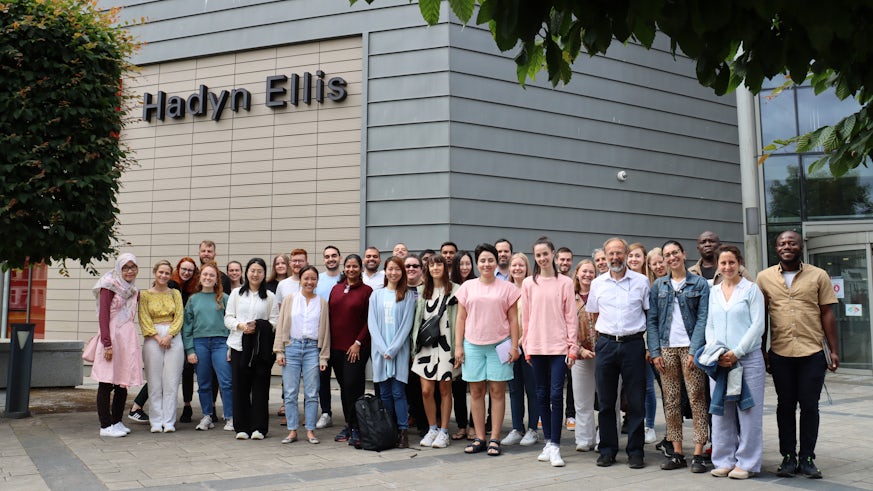'A career affirming experience': My week at the MRC CNGG
25 July 2022

Each year, the MRC Centre for Neuropsychiatric Genetics and Genomics (MRC CNGG) and the National Centre for Mental Health (NCMH) at Cardiff University organises a summer school in Brain Disorders Research to provide a grounding on the subject and inspire future researchers. Jennifer Luu, a medical student and attendee of this year’s Summer School writes about her experiences.
If I had a lung infection in A&E, the doctor could analyse my sputum and select an effective antibiotic to target the cause.
“Why could we not do the same for a patient with depression?” Asked Professor Jeremy Hall, concluding the final lecture of the four-day Summer School.
My hand shot up because I was being pedantic, and I exclaimed this example was not comparable as depression is usually seen by the GP, despite fully grasping his point that advances in neuropsychiatry have been slow.
He smiled and welcomed the debate, encouraging the rest of the audience, which was 2/3 of lecture hall space in the modern Hadyn Ellis building and a bunch of muted zoom faces to join in.
Professor Hall highlighted the current limitations of representative research models, and how we cannot develop effective treatment without connecting the dots between differences in our neurochemistry and the impact on our brains that result in disease.
He continued with delight about mini brains that his teams had focused on as his push in the direction of solving the conundrum of research models. I reminisced about my biochemistry education while he gave us an update on the developments in nerve cell differentiation and brain cell cultivation.
It was a good lecture.
The summer school did not disappoint to deliver a range of talks on research in psychiatry, neurology and neuroscience.
Perhaps I missed lab work or enjoyed the stretch and small talk on specific points of the previous in-depth and packed lecture, because touring the many research labs of the MRC centre was so fun.
I saw giant 7 tesla MRI machines capable of intense high resolution, which are still rare in the UK; contrasted to portable 0.7 tesla machines that were in development.
Could you imagine the benefit of shorter waiting times to scan a patient in emergency care?
Increasing understanding of rare genetic factors in schizophrenia, epilepsy and movement disorders demonstrated in the research of speakers presenting at the summer school brought forward the endless ethical debate of genetic testing.
Dr Michael Arribas-Ayllon challenged views on the roles of the researcher, genetic counsellor and, even parent/s seeking and interpreting results of genetic risk.
What made this activity so great was the range of backgrounds of the attendees, spanning from public and private research to grades of clinicians from across the globe. It was an insight to hear views formed from unifying knowledge bases like the World Health Organisation (WHO) screening criteria and how these differ from the roles and responsibilities of junior researchers in Europe.
I’ve come away with great contacts for medical student teaching I am arranging – the breakfast and lunch provided each day definitely helped with this networking!
It was a warming experience to be with many others as interested in the talks as I was. Dr Kimberly Kendall delivered a caring speech on her experiences and offered Q&A on the local programmes and practicalities of research careers in medicine.
As a budding researcher, the summer school affirmed that this is something I would like to be involved with in the future. I even managed to be a true Doctor Who fan and visit Cardiff Bay!

Increasing understanding of rare genetic factors in schizophrenia, epilepsy and movement disorders demonstrated in the research of speakers presenting at the summer school brought forward the endless ethical debate of genetic testing.
Dr Michael Arribas-Ayllon challenged views on the roles of the researcher, genetic counsellor and, even parent/s seeking and interpreting results of genetic risk.
What made this activity so great was the range of backgrounds of the attendees, spanning from public and private research to grades of clinicians from across the globe. It was an insight to hear views formed from unifying knowledge bases like the World Health Organisation (WHO) screening criteria and how these differ from the roles and responsibilities of junior researchers in Europe.
I’ve come away with great contacts for medical student teaching I am arranging – the breakfast and lunch provided each day definitely helped with this networking!
It was a warming experience to be with many others as interested in the talks as I was. Dr Kimberly Kendall delivered a caring speech on her experiences and offered Q&A on the local programmes and practicalities of research careers in medicine.
As a budding researcher, the summer school affirmed that this is something I would like to be involved with in the future. I even managed to be a true Doctor Who fan and visit Cardiff Bay!
Summer School 2023
Our next summer school will take place in early July 2023. The dates and details of how to apply will be finalised later this year. If you are interested in attending, keep an eye on our Summer School page in early February to apply.